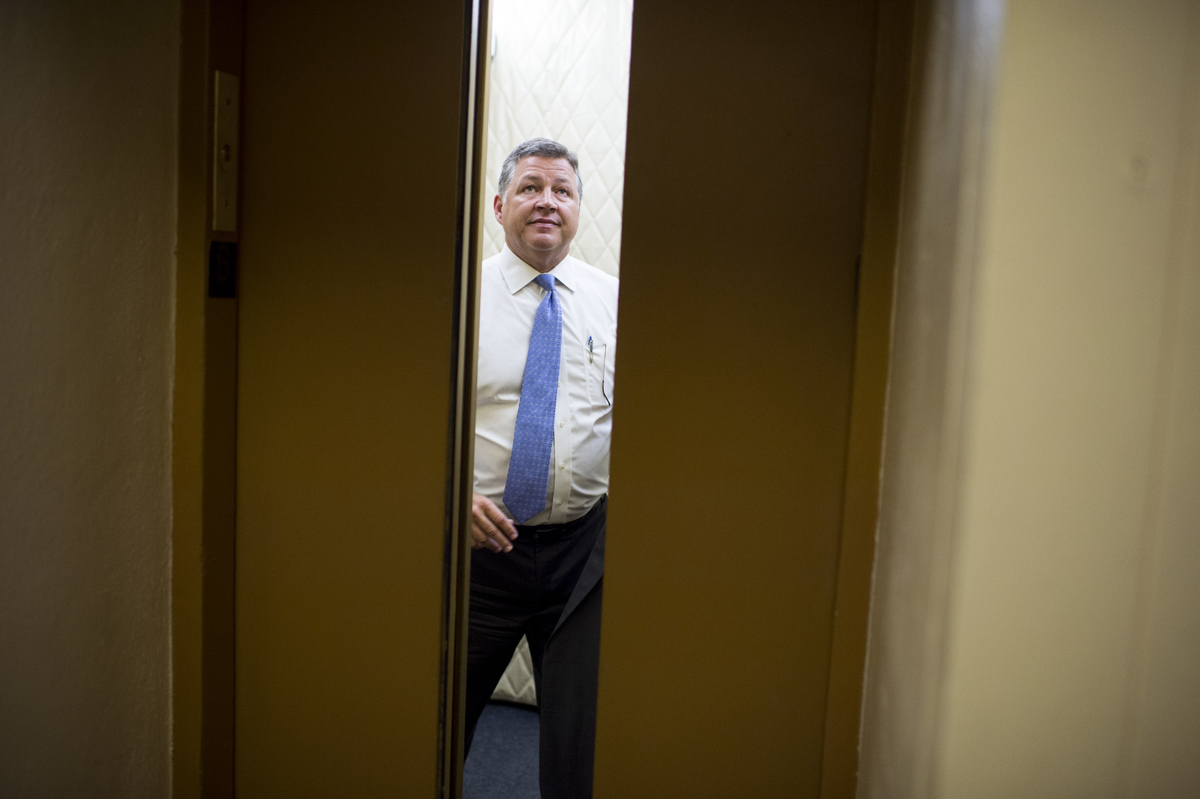Bill Shuster Wants ‘Like Father, Like Son’ Moment

When negotiators on the highway and mass transit bill formally convened Wednesday, it took only a few minutes for them to cut their first deal: Rep. Bill Shuster was named chairman of the conference committee.
The decision further cements the Pennsylvania Republican’s standing as one of the most prominent legislators of the year — and it raises the stakes for his performance in the next few weeks.
A new set of policies and payments for public works, six years overdue, is now tantalizingly close to becoming one of the biggest achievements in the first year of the 114th Congress. Shuster made clear at the conferees’ opening session he will press hard for an agreement soon after next week’s holiday recess.
“So, staff on both sides of the aisle, happy Thanksgiving,” he said.
It’s a moment he’s been preparing for throughout his three years at the helm of the House Transportation and Infrastructure panel. But he began his schooling for this time as a boy, aided by the example and perhaps the genetics of his father.
The 54-year-old Shuster appears to be the first House member since before the Civil War to wield the same committee gavel as a parent. But the politics of public works have changed so fundamentally in recent years that it’s hardly fair to compare the current chairman with his familial predecessor.
Both have ardently advocated for generous spending on more roads, bridges, tracks and tarmacs as an engine of economic development and job creation. Bud Shuster, now 83 and gone from the Hill for 14 years, was able to achieve his goals in the 1990s because government coffers were relatively full and earmarking was the accepted grease of legislative life.
But Bill Shuster is chairman at a time when parochial pet projects are verboten, transportation accounts are tapped out and his fellow Republicans have been loath to raise fresh revenue for replenishment.
The Highway Trust Fund, the government’s principal kitty for construction, is effectively empty as a consequence of GOP intransigence about increasing the federal excise taxes on gasoline. It was last raised in 1993, just before the elder Shuster started his chairmanship.
Nonetheless, two weeks ago the younger Shuster won 363 votes for his transportation measure — after three-dozen amendment roll calls over three days, the first test for the more open legislative process promised by new Speaker Paul D. Ryan, Shuster’s occasional workout companion in the members’ gym.
The bill would authorize projects and set policies for the next six years but maintain status-quo levels of transportation spending for only half that time. And much of that money would come from a hodgepodge of sources derided by the measure’s critics as accounting gimmicks — shifting $59 billion on paper to the Treasury from the Federal Reserve, for example, and counting on super-high oil prices to generate $9 billion from selling part of the Strategic Petroleum Reserve.
If the conferees can hatch an agreement that gets through Congress and wins President Barack Obama’s signature, Shuster would secure a legislative trophy that was arguably much tougher to win than any of those brought home by his father.
Dubbed the “King of Asphalt,” Bud Shuster stands as one of the great committee barons of modern times, who succeeded in stuffing so many earmarks into his bills that they routinely passed by lopsided bipartisan margins, sometimes even over the objections of GOP leaders. (His power was so complete that he not only succeeded in getting a new interstate built through his rural district, but also got the road named in his honor and decreed it would be dubbed I-99 — in total disregard for the numbering convention for those highways.)
Shuster the younger has amassed insider powers in other ways: helping leadership as a deputy whip, recruiting candidates for the National Republican Congressional Committee and raising plenty of money for others as well as for himself. (As evidence he’s fond of all forms of transportation, he hosts a fundraiser every summer at the Saratoga thoroughbred race track in upstate New York.)
“I can say this with more authority than anyone today,” the son quipped to The Washington Post in 2014, “This is not my father’s Congress.”
Both Shusters were political neophytes before coming to the Hill. Bud was a computer salesman and electronics entrepreneur until taking his seat in the House (and on the public works panel) days after Bill’s 12th birthday. After college Bill worked for a pair of tire companies before opening a Chrysler dealership. The father resigned in 2001, early in his 15th term, amid a lingering ethics probe into the married congressman’s relationship with a former aide-turned-lobbyist with business before his committee. The son survived complaints about nepotism and won the special election to replace him, with 52 percent.
He hasn’t had a tough time holding his seat in general elections since. But his combination of public works pragmatism and social conservatism (he’s solidly in favor of gun rights and opposed to abortion rights) hasn’t been sufficient to hold off a few dogged primary challenges. The most recent was in 2014, when he aired almost $700,000 in TV spots but prevailed with only 53 percent against Art Halvorson, a retired Coast Guard official who campaigned on both anti-incumbent and tea party themes.
In one more sign of filial similarity, soon after Shuster’s divorce last year he revealed he was dating a transportation lobbyist, Shelley Rubino of Airlines for America. But while the father’s lobbyist friend Ann Eppard sought to keep their dealings secret, both halves of the younger couple have publicly discussed their consultations with lawyers to assure they’re maintaining proper conflict-of-interest boundaries.
See photos, follies, HOH Hits and Misses and more at Roll Call’s new video site.
Get breaking news alerts and more from Roll Call in your inbox or on your iPhone.





